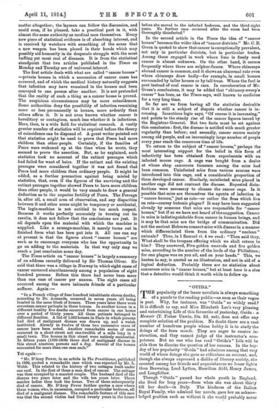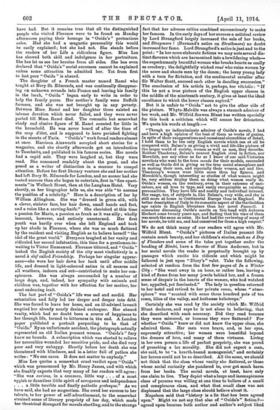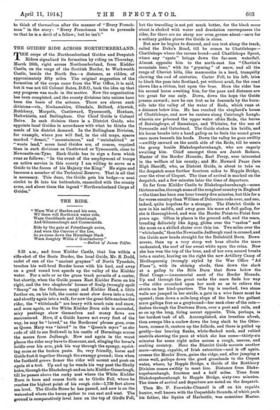"OUIDA."
THE popularity of the lesser novelists is always something of a puzzle to the reading public—as soon as their vogue is past. Why, for instance, was " Oujda " so widely read?
It is difficult to say, and Miss Elizabeth Lee's very pleasing and entertaining Life of this favourite of yesterday, Ouida : a
Memoir (T. Fisher Unwin, 10a. 6d. net), does not offer any complete solution of the problem. No doubt there are a vast number of humdrum people whose hobby it is to study the doings of the beau monde. They are eager to receive in- struction, and they cannot judge of the instructor's com- petence. But no one who has read "Ouida'a " Life will be able thus to dismiss the question of her success. In the hey- day of her popularity "Oaida " had admirers among that vety world of whose doings she gave so ridiculous an account, and, though she always expressed a dislike of literary society, she counted among her friends and acquaintances no lesser lights than Browning, Lord Lytton, Hamilton Aide, Henry James, and Longfellow.
Though " Ouida " passed her whole youth in England, she lived for long years—from when she was about thirty till her death—in Italy. The kindness of the Italian Royal Family, who admired her novels, gave her an acknow- ledged position such as without it she would probably never have had. But it remains true that all the distinguished people who visited Florence were to be found on Monday afternoons paying their homage in " Ouida's " pretentious salon. Had she bad a magnetic personality this would be easily explained; but she had not. She stands before the readers of her Life a ridiculous figure. Miss Lee has showed both skill and indulgence in her portraiture. She has let us see her heroine from all sides. She has even declared that " Oujda's" social successes cannot be explained unless some attraction be admitted her. Yet from first to last poor " Ouida " is absurd.
The daughter of a French master named Rawl who taught at Bury St. Edmunds, and was continually disappear- ing on unknown errands into France and leaving his family in the lurch, " Ouida " began early to write in order to help the family purse. Her mother's family were Suffolk farmers, and she was not brought up in any poverty. Between Mine. Ramo and her daughter there existed an intense devotion which never failed, and they were never parted till Mme. flame died. The romantic but somewhat shady and elusive figure of H. Rame counted for little in the household. He was never heard of after the time of the coup d'etat, and is supposed to have perished fighting in the streets of Paris. " Ouida'a" work found readers almost at once. Harrison Ainsworth accepted short stories for a magazine, and she shortly afterwards got an introduction to Tauchnitz, and published in his famous series. Her novels had a rapid sale. They were laughed at, but they were read. She romanced readably about the great, and she posed as a writer of distinction in a manner to compel attention. Before her first literary venture she and her mother had left Bury St. Edmunds for London, and no sooner had she tasted success than she began to entertain, first in "fine apart- ments "in Welbeck Street, then at the Langham Hotel. Very shortly, as her biographer tells us, she was able "to assume the position of a celebrity." Here is a description of her by William Allingham. She was "dressed in green silk, with a clever, sinister face, her hair down, small hands and feet, and a voice like a carving-knife." She cherished at this time a passion for Mario, a passion as frank as it was silly; wholly innocent, however, and entirely unreturned. Her first youth was hardly over when she left England and took up her abode in Florence, where she was so much flattered by the resident and visiting English as to believe herself "the idol of the great world." Everyone laughed at her vanity and ridiculed her second infatuation, this time for a gentleman-in- waiting to Victor Emmanuel. Florence tittered, and" Ouida " lashed the English society of the city most vindictively in a novel a clef called Friendship. Perhaps her singular appear- ance—she wore her hair down her back until after middle life, and dressed in light-coloured satins in all seasons and all weeders, indoors and out—contributed to make her con- spicuous. She was always surrounded by a number of large dogs, and, indeed, her sympathy with animals and children was, together with her affection for her mother, her most endearing trait.
The last part of " Onida's " life was sad and sordid. Her ostentation and folly led her deeper and deeper into debt. She was forced to leave her home, and an ill-advised lawsuit emptied her already nearly drained exchequer. Her absurd vanity, which had no doubt been a source of happiness to her through life, turned to bitterness in the end. A London paper published a portrait purporting to be that of "Oujda." By an unfortunate accident, the photograph actually represented an old Italian peasant woman. " Ouida's " fury knew no bounds. A subscription which was started to relieve her necessities wounded her sensitive pride, and she died very poor and very unhappy. Shortly before her death she was threatened with blindness, and in a letter full of pathos she writes : "No one cares. It does not matter to anybody."
Miss Lee quotes a somewhat cruel verdict upon " Ouida " which was pronounced by Mr. Henry James, and with which she frankly expects that very many of her readers will agree: "She was curious, in a common, little way . . . of a most oppish or dauntless little spirit of arrogance and independence . . . a little terrible and finally pathetic grotesque." As we have said, she had no magnetism. She owed her success to her talents, to her power of self-advertisement, to the somewhat strained sense of literary propriety of her day, which made her theatrical disregard for morels startling, and to the strange
fact that her adverse critics combined unconsciously to make her famous. In the early days of her success a satirical review by Lord Strangford largely increased the sale of her books, and Mrapmore ! (Burnand's satire on Strathmore) no doubt increased her fame. Lord Strangford's satire is just and to the point: "In her more elaborate fictions we may note several dis- tinct flavours which are harmonized into a bewildering whole—. the superhumanly beautiful woman who breaks hearts as coolly as crockery; the delightfully wicked rind who ruins women by the score and shoots men by the dozen; the horsy young lady. with a turn for flirtation, and the sentimental cavalier after Sir Walter Scott, succeed each other in dazzling succession.' The conclusion of his article is, perhaps, too vitriolic: "If this be not a true picture of the English upper classes in the middle of the nineteenth century, it gives at least the ideal excellence to which the lower classes aspired."
But it is unfair to " Ouida" not to give the other side of the picture. Whyte-Melville was always a staunch admirer of her work, and Mr. Wilfrid Scawen Blunt has written specially for this book a criticism which will amaze her detractors. We quote his words at length :— " Though no indiscriminate admirer of Ottida's novels, I had and have a high opinion of the best of them as works of genius. In spite of their exaggerations and occasional absurdities of detail, I hold them to ho the only English novels which can at all be compared with Balzae's as giving a vivid and life-like picture of the larger world of society, women as well as men, they describe. Neither Thackeray, Balzac's nearest English rival in fiction, nor Meredith, nor any other as far as I know of our mid-Victorian novelists who went to the beau monde for their models, succeeded as well as Ouida did in giving us the true social atmosphere and in making their men, and especially their women, act and live. Thackeray's women were little more than lay figures, and Meredith's, though interesting as studies of what women might be, very seldom display them as doing what, women really do. Guide's women, on the contrary, even in their extreme of cari- cature, are all true to type, and easily recognizable as existing personalities. They have life and reality and individual interest. Her range, too, of subjects is, like Balzac's, very wide, and she is still more at home in Continental Europe than in England. No better description of Italy in its romantic aspect of the Garibaldi= age exists in English literature than her novel Paseartl. I remember discussing Onida's merits on this head with Auberon Herbert some twenty years ago, and finding that his view of them was much the same as mine. He had had the reviewing of many of her novels, he told me, and had conceived for them a high respect.'
We do not think many of our readers will agree with Mr. Wilfrid Blunt. " Oujda's" pictures of Italian peasant life contain much beauty, and her children's stories, such as A Dog of Flanders and some of the tales put together under the beading of Bimbi, have a flavour of Hans Andersen, but in her social novels the reader is perpetually brought up by passages which excite his ridicule and which might be fathered in jest upon "Dizzy's " valet. Take the following, selected at random from the first few pages of In a Winter City : "She went away in an hour, or rather less, leaving a kind of flame from her many jewels behind her, and a frozen sense of despair in the hearts of the women, who had watched her, appalled, yet fascinated." The lady in question returned to her hotel and retired to her private room, whose " atmo- sphere " was "scented with some three hundred pots of tea roses, lilies of the valley, and hothouse heliotrope."
Certainly she was read by the society which Mr. Wilfrid Blunt declares, and says he is not alone in believing, that she described with such accuracy. Did they read because they were mirrored, or because they were flattered ? For whether " Onida " knew or did not know the upper class, she admired them. Her men were brave, and, in her eyes, supremely attractive; her women were beautiful beyond the dreams of love, and many of them virtuous!. Living in her own person a life of perfect propriety, she was proud of preaching a lax morality. She did not expect a man, she said, to be "a hearth.bound monogamist," and certainly her heroes could not be so described. All the same, we should not think that the class whose vanity she flattered, or those whose social curiosity she pandered to, ever got much harm front her books. The social novels, at least, bare only one claim to live. They depict what a large and inconspicuous class of persons was willing at one time to believe of a small and conspicuous class, and what that small class was not displeased that the large class should believe about it.
Napoleon said that 'history is a lie that has been agreed upon." Might we not say that also of " Ouida's " fiction ?— agreed upon because both author and author's subject liked to think of themselves after the manner of "Every French- man" in the story : "Every Frenchman tries to persuade us that he is a devil of a fellow; but he isn't."








































 Previous page
Previous page